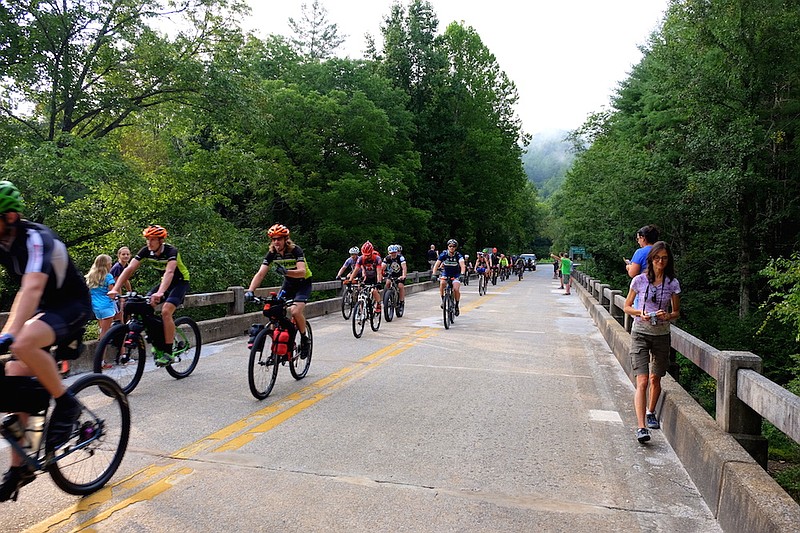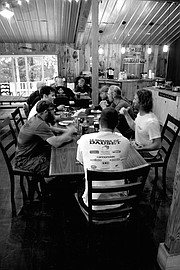Don't underestimate the terrain of North Georgia.
Mountain bikers in the Trans North Georgia Adventure have been doing the race since 2011. And, according to Derek Kozlowski, director of the little-known event, only about half those who have dared attempt the 350-mile ride from the state's border with South Carolina to its border with Alabama have completed the trek.
The brutality of the TNGA makes it unlike any bike race in the South, but even with relatively few local participants, it continues to grow in popularity within the niche world of hardcore bikepacking events.
A crop of more than 60 hopeful finishers from all over the country - and some from Canada - will start the race again this weekend, with proof of their own fortitude as the only purse, and pride as the only podium awaiting at the finish line.
Riders tough enough to complete the TNGA will have spent 72 percent of their journey on unpaved surfaces, making their way west across the Chattahoochee National Forest and Cohutta Wilderness to the Georgia-Alabama border west of Rome, Ga.
"We have people coming down from Canada, Indiana, Ohio, people from Texas, and they just underestimate how hard it is and how remote," said Kozlowski, a Ringgold, Ga., resident. "Where we start, it's 50 miles before you can quit, because there's nothing. You're 50 miles away from even cell reception.
"You can quit anytime you want in the first 50 miles, but you've still got to finish that to get to somewhere where you can call someone to come get you."
---
The fastest few riders in the field might complete the event in under two days, but some will linger on the course for nearly a week, trudging up the 56,000 feet of climb that are part of the course.
There are no official aid stations along the way. Riders have access to whatever they can pack with them and whatever supplies they can buy in the glimpses of civilization dotting the wilderness route.
By the time they reach Mulberry Gap Mountain Bike Getaway between Ellijay and Chatsworth, riders have covered more than half the course and the journey has taken a toll.
"Some of them come in and talk about hallucinating on the trail and seeing things that they know couldn't have actually been there," Mulberry Gap co-owner Kate Gates said. "They're physically exhausted. They may also be mentally exhausted or emotionally exhausted, so it's a place they can come and recoup."
Riders can take advantage of all the services Mulberry Gap would offer to a normal mountain biker, meaning they can pay to stay in a cabin or at campsite, buy a hot meal, get their clothes washed and call their loved ones.
But it's a stop that carries a certain level of danger.
"They can get out of that rhythm, out of that pedaling and back to that sense of reality," Gates said. "The little demons inside your head can start talking you out of suffering through it when there is a hot shower, a cold bed and a beer waiting on you."
Those who carry on still have the hardest part of the journey ahead of them. Once they make a final stop at Bear Creek Bicycle Co. in Dalton, they hit a notoriously difficult stretch of the Pinhoti Trail and dip southwest through Whitfield, Walker and Chattooga counties to the finish line.
"They've got the hardest trail in the Southeast after they've already done 200-plus miles of racing," Kozlowski said of the Pinhoti. "It's not only a marquee section, but they're absolutely wasted by the time they hit it."
Bear Creek Bicycle staff stay up all hours of the night making hasty repairs to bikes that have been brutalized by the course as riders prepare for the final leg of the journey.
Kozlowski took the race over from its creator David Muse, who spent several years crafting the course. It started with just a handful of racers in 2011 but has gained a reputation for its toughness.
Surviving the TNGA is an indication that a rider is ready to attempt the Tour Divide, an annual event that takes riders across 200,000 feet of climb from Alberta, Canada, to New Mexico.
"If you can do this, then people know you can do the Tour Divide," Kozlowski said. "It's not as long, but in terms of how hard it is, if you can do this, you can go on and do some of these 3,000-mile races."
Riders wear a spot tracker that sends a satellite signal with their location to race officials, but part of the allure of this type of race is that there is no entry fee and few rules.
"It's gentlemen's rules," Kozlowski said, noting that women also compete in the TNGA. "People are doing this because they want to test themselves, and if someone cuts the course, the racers themselves take care of the discipline. If you're cutting the course, people are going to know it.
"This is all about proving what you can do."
Contact staff writer David Cobb at dcobb@timesfreepress.com or 423-757-6249.

